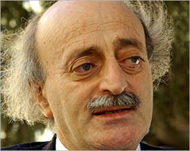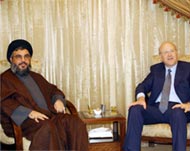Hizb Allah chief: We will keep our arms
Under mounting international pressure to disarm, Lebanon’s Hizb Allah has declared its stockpile of deterrrent rockets would strike anywhere in northern Israel if anyone tried to take them away.

“Any hand that reaches out to our weapons is an Israeli hand that will be cut off,” Hizb Allah chief Shaikh Hassan Nasrallah told tens of thousands of supporters on Wednesday – the fifth anniversary of Israel’s withdrawal from southern Lebanon.
“We do not want to attack anyone and will not allow anyone to attack Lebanon, but if anyone, anyone, thinks of disarming the resistance, we will fight them like the martyrs of Karbala,” he said, referring to a battle in Islamic history pivotal to Shias.
“Any thought of disarming the resistance is madness.”
Druze leader Walid Jumblatt also spoke at the rally, defending Hizb Allah’s right to keep arms. The prominent opposition leader told the thousands of Hizb Allah supporters that “We must not allow international interference to undermine Lebanon’s principles”.
Jumblatt recently forged an alliance with Hizb Allah in Mount Lebanon for the crucial parliamentary elections, due to kick off this Sunday.
‘Balance of terror’
Nasrallah, in his toughest stand yet on the question of Hizb Allah’s arms, told the thousands of supporters in the town of Bint Jbeil – part of a southern strip Israel occupied for 22 years – that the group’s arsenal of 12,000 rockets had created a “balance of terror” with regional superpower Israel.
 |
|
Druze leader Jumblatt supports |
But he added Shia Muslim Hizb Allah, backed by Syria and Iran, would use its weapons only in defence of Lebanon.
The largely Shia Muslim residents of the southern suburbs of Beirut, a Hizb Allah stronghold, celebrated the cleric’s words with fireworks and cheering.
“At the minimum the whole of occupied northern Palestine, its settlements, airports, factories and fields are under the hands of your sons in the Islamic resistance. They want to take this strength from Lebanon,” Nasrallah told tens of thousands of people waving the movement’s yellow flags.
“We do not want to drag the region into a war … . We want to protect our country, not destroy it, and that is why we will keep our arms.”
Under pressure
Hizb Allah was the only armed group to keep its arms after the end of Lebanon’s 1975-1990 civil war and its resistance was instrumental in prompting arch-enemy Israel to pull its occupation troops out of the south in May 2000.
|
“We do not want to attack anyone and will not allow anyone to attack Lebanon, but if anyone, thinks of disarming the resistance, we will fight them” Shaikh Hassan Nasrallah, |
But a UN Security Council resolution adopted in September that demanded that Syrian forces pull out, also called on all armed groups in Lebanon to hand over their weapons.
Damascus withdrew its forces in April and the question of Hizb Allah’s arms is expected to loom large on the international agenda after Lebanese general elections due to be held between 29 May and 19 June.
Nasrallah accused the US and other countries of interfering in Lebanese polls to force Beirut to serve its interests and those of its Israeli allies.
Source of strength
“The resistance, a core source of strength for Lebanon, will be targeted after elections,” Nasrallah said. “In the next stage, the resistance will be the number one target for Israelis, Americans and the West and we must prepare to confront this.”
 |
|
PM Miqati (R) regards Hizb Allah’s |
Nasrallah asked why the world was piling pressure on Hizb Allah and Syria to implement resolution 1559, when Israeli troops had been allowed to stay on Lebanese soil for more than two decades despite a UN resolution demanding they leave.
Jumblatt, one of the most vocal critics of Syria’s interference in Lebanese politics, said that Hizb Allah had to be protected “out of loyalty to slain premier Rafiq al-Hariri”.
He added that Lebanon needed to hold a “calm dialogue according to the Taif Accord [which ended the civil war] away from suspicious foreign interference”.
Lebanon’s interim government has declared that Hizb Allah’s arms are an internal matter.